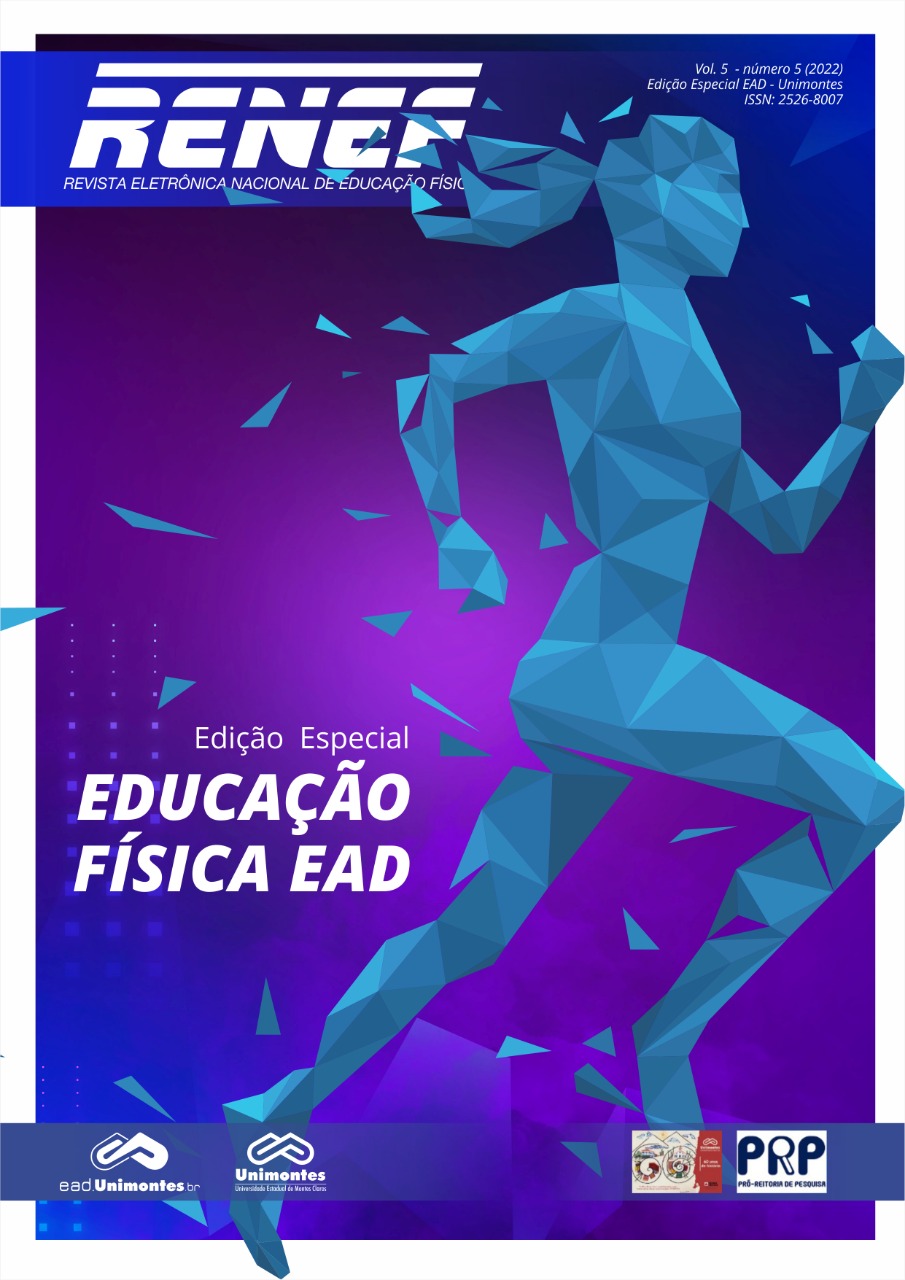Association between eating habits, physical activity and nutritional status in schools during the Covid-19 pandemic
Keywords:
Eating habits, Lifestyle, Teens, Social isolationAbstract
This study sought to evaluate the association between eating habits, physical activity and nutrition during the Covid-19 pandemic. This is a cross-sectional and approved study with adolescents enrolled in elementary school II. In view of the pandemic, data collection was carried out in virtual format through Google forms. Questions related to sociodemographic profile, eating habits, physical activity and nutritional status were collected. Pearson's chi-square test was used for data analysis, considering p ≤0.05 as significant. The sample consisted of 287 students, of which 60.3% (n=173) are female. The intake of beans was shown to be a nutritional % in 07.03 students, with significant differences between the state=0.033. Low consumption of vegetables and fruits was present in 67.2% and 84.3% of students, respectively. Being an age group of 11 to 13 years associated with fruit consumption (p=0.054). As for non-food, the intake of sweets (69.0%) and soft drinks are recommended, and 54.4% of the students recommend snacks in an adequate assessment. There were significant differences between the age groups (p=0.55) with the consumption of snacks and between the practice of physical activity with the ingestion of soft drinks (p=0.027). It is concluded that social isolation affects the quality of adolescents' diet, showing a low habitual frequency of consumption of vegetables and fruits, and a high frequency of consumption of sweets, snacks, and soft drinks. Being the students from 11 to 13 years old and who practice insufficient physical activity, associated with the consumption of non-human foods.
Downloads
References
ALLABADI, H. et al. Impact of COVID-19 lockdown on dietary and lifestyle behaviours among adolescents in Palestine. Dynam Human Health, v. 7, n. 2, 2170, 2020.
AMMAR A et al. Effects of COVID-19 Home Confinement on Eating Behaviour and Physical Activity: Results of the ECLB-COVID19 International Online Survey. Nutrients, v.12, p. 1583, 2020.
BRITO, A. A.; THIMÓTEO, T. B.; BRUM, F. Redes sociais, suas implicações sobre a imagem corporal de estudantes adolescentes e o contexto da pandemia do coronavírus (COVID-19). Temas em Educação Física Escolar, v. 5, n. 2, p. 105-125, 2020.
Direção-Geral da Saúde. REACT-COVID Inquérito sobre alimentação e atividade física em contexto de contenção social; 2020.
LOPES, J. R. et al. Adequação a uma alimentação saudável em adolescentes escolares e perfil bioquímico associado. Cadernos Saúde Coletiva [online], v. 29, n. 3, p. 301-313, 2021.
MAIA, E. G. et al. Padrões alimentares, características sociodemográficas e comportamentais entre adolescentes brasileiros. Revista Brasileira de Epidemiologia, v. 21, n.1, p. e180009,2018.
MALTA, D. C. et al. The COVID-19 pandemic and changes in the lifestyles of Brazilian adolescents. Revista Brasileira de Epidemiologia. v. 24, e210012. 2021.
MARQUES, E. S. et al. A violência contra mulheres, crianças e adolescentes em tempos de pandemia pela COVID-19: panorama, motivações e formas de enfrentamento. Cad Saúde Pública, v.36, e00074420, 2020.
MELO, S. P. S. C. et al. Sobrepeso, obesidade e fatores associados aos adultos em uma área urbana carente do Nordeste Brasileiro. Revista Brasileira de Epidemiologia. v. 23, e200036, 2020.
OLIVEIRA, L. V. et al. Modificações dos Hábitos Alimentares Relacionadas à Pandemia do Covid-19: uma Revisão de Literatura. Brazilian Journal of Health Review, v. 4, n. 2, p. 8464-8477, 2021.
PERRAR, I.; ALEXY, U.; JANKOVIC, N. Changes in Total Energy, Nutrients and Food Group Intake among Children and Adolescents during the COVID-19 Pandemic-Results of the DONALD Study. Nutrients, v. 14, n. 2, p. 297, 2022.
PIETROBELLI, A. et al. Effects of COVID-19 Lockdown on Lifestyle Behaviors in Children with Obesity Living in Verona, Italy: A Longitudinal Study. Obesity (Silver Spring), v.28, n.8, p.1382-85, 2020.
PINHO, L. de. et al. Associação entre prática de atividade física e consumo alimentar em adolescentes escolares. Revista de Educação Física. v. 32, e3253. 2021.
RICHTER, S. A. et al. Como a quarentena da COVID-19 pode afetar o sono das crianças e adolescentes?. Resid Pediatr, v.11, n.1, p.429, 2020.
RUIZ-ROSO, M. B. et al. Covid-19 Confinement and Changes of Adolescent’s Dietary Trends in Italy, Spain, Chile, Colombia and Brazil. Nutrients, v.12 n.6, p.1807, 2020.
SZWARCWALD, C. L. et al. Adesão às medidas de restrição de contato físico e disseminação da COVID-19 no Brasil. Epidemiol Serv Saúde, v. 29, n.5, p.e2020432, 2020.
WERNECK, A. O. et al. Associations of sedentary behaviours and incidence of unhealthy diet during the COVID-19 quarantine in Brazil. Public health nutrition, v. 24, n. 3, p. 422–426, 2021.
World Health Organization (WHO). Coronavirus disease (COVID-19) Pandemic. 2020 Disponível em: https://www.who.int/emergencies/diseases/novel-coronavirus-2019. Acesso em 01 Nov. 2021.
World Health Organization. Diet, Nutrition and the Prevention of Chronic Diseases. Report of a Joint WHO/FAO Expert Consultation. Genebra: World Health Organization; 2003.
WU, C. et al. Risk factors associated with acute respiratory distress syndrome and death in patients with coronavirus disease 2019 Pneumonia in Wuhan, China. JAMA Intern Med, v.180, n.7, p. 934-943, 2020.






















